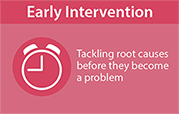Pioneering work to help families in need and stop crime before it happens – in which Staffordshire is playing a lead role – has been highlighted on a national stage.
Intervening early to tackle the root causes of crime is a priority for Matthew Ellis, Police and Crime Commissioner for Staffordshire.
Analysis by the Early Intervention Foundation (EIF) has found that dealing with crime and anti-social behaviour costs public services an estimated £5.2 billion a year – £1.8 billion of which falls to the police. On top of this, growing numbers of police call outs are related to social problems such as domestic violence, children going missing, mental health and other welfare concerns.
Staffordshire was the only PCC’s office in the country to form part of the Early Intervention Academy for Police Leaders in August 2015. This followed Staffordshire being chosen as a Pioneering Place in 2013 by the EIF to do even more work to prevent people from slipping into a life of crime.
The Academy has developed plans to reduce demand by tackling the causes of crime, freeing up police resources to tackle crime and protect vulnerable people through placing early intervention at the heart of policing.
Academy representatives met with Rt Hon Mike Penning MP, the Minister of State for Policing, Fire and Criminal Justice and Victims, and other leaders in London yesterday (Thursday 30 June) to ask for national backing for their work. This includes equipping frontline police officers and PCSOs to respond to wider problems than just the issue they are called to and more joined-up working between public services to deliver effective early intervention in local communities.
Mr Ellis said: “Tackling the root causes of crime rather than the effects is at the centre of my Safer, Fairer, United Communities strategy.
“Making sure that public services intervene early and stop problems before they happen is not only better for those individuals involved but also the best way of reducing crime and making a positive impact on their communities for the long term.
“The evidence is clear that reducing repeat offending and in some cases ‘breaking the cycle’ which is often generational, really works, not just in the short term, but for years to come.
“We have worked with the EIF to see how early intervention can be incorporated into daily police business and the benefits of doing so in Staffordshire. This is now being made available to champion the early intervention agenda nationally.”
Donna Molloy, EIF Director of Dissemination, said: “The police are often the first agency to spot parents, children or families needing help and it is vital that they are equipped to work alongside health and children’s services, schools and others at spotting risks and ensure the right support is given at the earliest opportunity.
“The Early Intervention Academy for Police Leaders has chimed with the mood of many forces who increasingly recognise that working differently is the only way to reduce demand on the police. That is not about the police doing everything but about frontline police being professionally curious and working in partnership to make sure that when they identify children, young people or families who need support, there is an effective response.
“Rather than 43 forces working it out for themselves we have brought together those at the cutting edge of this important agenda. The EIF academy members now represent an important force for change in policing. We hope their work gets the backing it deserves.”
Find out more about the PCC’s Safer, Fairer, United Communities strategy here



